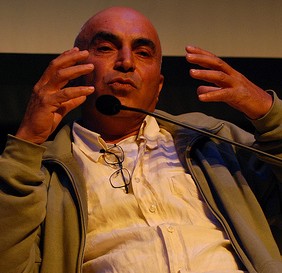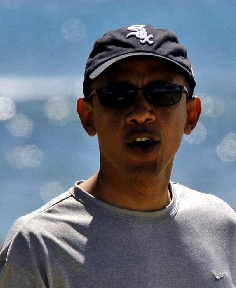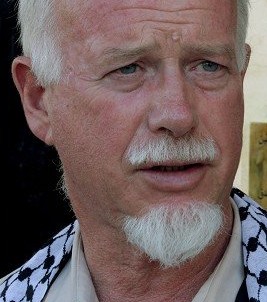U.S. asks Israel for one-year settlement freeze
By Barak Ravid, Haaretz, August 6, 2009
American Middle East envoy George Mitchell has asked Prime Minster Benjamin Netanyahu and Defense Minister Ehud Barak for a “deposit,” an advance commitment of a one-year freeze on construction in West Bank settlements.
Mitchell raised the idea in his talks with Netanyahu and Barak in Israel last week. He argued that the Arab states will not make gestures toward normalization with Israel without a guarantee of an end to building in the settlements. Mitchell said an Israeli agreement to temporarily freeze construction would facilitate concessions from the Arab states.
A senior source in Jerusalem noted that while Netanyahu and Barak did not reject the request, they disagree with the Americans over some of the details. Mitchell asked for a construction freeze of at least a year, but Israel has agreed to suspend building on the settlements for six months, at most.
The Americans have not yet said clearly what will happen at the end of the freeze period. Israel wants a U.S. commitment to reach new understandings with Jerusalem over future developments that would be similar to those between former president George W. Bush and former prime minister Ehud Olmert.
Israel and the U.S. also disagree over the future of 2,500 housing units already under construction in the settlements. Israel wants to complete all of these homes, while Mitchell seeks to reduce the number to be completed as much as possible.
Negotiations over the issue will continue over the coming weeks. Netanyahu and Mitchell are to meet in London on August 26 for another round of talks. A highly-placed source in Jerusalem said he expected agreement on the issue at the meeting.
The Americans presented the deposit concept at a meeting in Jerusalem on Friday of representatives of the Middle East Quartet. Mitchell’s deputy, David Hale, said the administration of President Barack Obama is seeking similar promises from the Arab states. Representatives of the European Union, the United Nations and Russia spoke of the need to consider the next stage – the renewal of peace negotiations – in addition to determining a party to mediate between the Palestinian Authority and Israel. Hale said public disclosure in the near future of a formula for the next stage would harm negotiations.
On Monday Israel’s ambassador to the U.S., Michael Oren, was summoned to the State Department for a reprimand, for the second time in two weeks. This time it was over the eviction of two Palestinian families from their homes in the Sheikh Jarrah neighborhood of East Jerusalem. The State Department called the eviction a provocation that was contrary to the spirit of the road map. At the previous meeting, two weeks ago, State Department officials conveyed to Oren their displeasure over plans to build housing for Jews on the site of the Shepherd Hotel in Sheikh Jarrah.
Israel’s ambassador in Stockholm, Benny Dagan, was also summoned to the Swedish foreign ministry in protest at the evictions of Palestinians. Sweden currently holds the rotating presidency of the European Union.
From Sheikh Jarrah to Sheikh Munis
By Gideon Levy, Haaretz, August 6, 2009
At the top of the hill, a few dozen meters from where a house now stands, there used to be an irrigation pool for the village citrus groves. I swim every morning at the municipal swimming pool built on the ruins of the village irrigation pool. Palestinian Jaffa oranges grew in the now-vanished groves. My house stands there now. The land was “redeemed,” as land acquisition was called in Zionist propaganda. In the case of Sheikh Munis, it was redeemed by force, and Tel Aviv’s Ramat Aviv neighborhood was built there, including Tel Aviv University, a magnificent academic institution built on the ruins of a village whose 2,230 inhabitants were surrounded and threatened. They fled, never to return.
All that remains of the large village is Habayit Hayarok (now a conference and party center) another house on Levanon Street and the cemetery, which sits neglected on the outskirts of the parking lot of an intimidating government facility – no outsiders allowed. Of course, there is neither a memorial nor a monument to the village that was wiped off the face of the earth – one of 418.
Somewhere, perhaps in a refugee camp in terrible poverty, lives the family of the farmer who plowed the land where my house now stands. According to the Israeli judicial system, they have the right to get their land back immediately, destroy my house, return and grow Jaffa oranges for export on its ruins, and remove me by force if necessary. The Jerusalem District Court, which recently ruled that representatives of the Sephardi community committee had the right to take back the Hanun and Gawi families’ apartments in East Jerusalem’s Sheikh Jarrah neighborhood, has opened the 1948 file.
That is, if Israel had an egalitarian system of law and justice, if the legal system were fair, because then millions of Palestinians would be able to applaud the court and demonstrate their joy in the streets at the ruling. The road to justice denied in 1948 has been opened to everyone. From now on, Jews and Arabs will be able to demand the restitution of their property. The return is in the offing, with the backing of the Israeli justice system.
But of course, it’s not like that. The court that sealed the fate of the two Palestinian families and allowed extremist settlers to live in their place has once again laid bare the rule of law’s true state in Israel: racist and applying a double-standard, with separate legal systems for Jews and Arabs.
We should perhaps thank the court for its scandalous ruling, which not only sparked a justifiable international wave of protest against Israel, but also revealed its true face. “There are judges in Jerusalem,” as Menachem Begin said, and they have made it official: apartheid. Ownership rights are for Jews alone.
The distance between Sheikh Jarrah and Sheikh Munis has been shortened in one fell swoop. Those who contend that Jews must be given back their property cannot in the same breath deny the Palestinians’ property rights because of their national origin. It’s true that a system of strict laws and regulations denies the Palestinians what it allows the Jews, but all reasonable Israelis must now ask themselves if this is the system of justice and the law of the “Jewish” state they want to live in.
It is impossible to ignore the injustices of 1948 while hundreds of thousands of refugees rot in the camps. No agreement will hold water without a solution to their plight, which is more feasible than Israel’s strident scaremongers suggest. But rulings like the current one make it harder to distinguish clearly between Sheikh Jarrah and Sheikh Munis, between the conquest of 1948 and the conquests of 1967. My house stands on land stolen by force, and it is the obligation of Israel and the world to redress the injustice without creating injustice and new dislocation. My house stands on land that was stolen, but the whole world has recognized the Jews’ right to establish their state there. At the same time, no country in the world has recognized Israel’s right to conquer Sheikh Jarrah as well.
In my morning musings on the way to the pool, I sometimes think about the land’s original owners. I long for the day when Israel takes moral and material responsibility for the injustice done to them. Now, because of the court ruling, my right to continue to swim here may also be in doubt.
Israel waging war of nerves against Iran and Hezbollah
Amos Harel, Haaretz, August 6, 2009
This week’s reports by The Times of London give the impression that Israel is raising the bar in the war of nerves against Iran and Hezbollah. On Monday the newspaper reported that Iran had completed its nuclear research program, and that its progress toward building a nuclear bomb depends only on the decision of Supreme Leader Ali Khamenei. The following day, it warned of the danger of escalation between Israel and Hezbollah on the Lebanese border.
Both articles were written by the paper’s foreign news editor, Richard Beeston, who was in Israel last week.
The report on Iran’s nuclear program is based on anonymous “Western” intelligence sources. But at a Knesset Foreign Affairs and Defense Committee briefing on Tuesday, the head of the Military Intelligence research brigade, Brig. Gen. Yossi Baidatz, used almost identical terms to those of The Times.
Iran, Baidatz told the MKs, will soon reach the point where it can “charge forward toward a nuclear weapon.” Beginning in 2011, he said, use of the Iranian nuclear bomb will depend only the decision to deploy it, not on technological factors.
Sources for the newspaper’s report on Israel-Hezbollah tensions are not known. The Times quotes Israel Defense Forces Deputy GOC Northern Command Alon Friedman as saying the northern border could “explode at any minute.”
The timing of the articles implies that someone in Israel’s defense establishment wanted to deliver an explicit, public declaration on both the Iranian and Lebanese fronts. The fact that this source allowed a senior British journalist, to meet with and quote the Northern Command’s number-two officer appears not to have been accidental. Chief of Staff Gabi Ashkenazi, and other top officers, seldom grant interviews, much less to the foreign press.
Last week, in the wake of the mysterious explosion at a Hezbollah Katyusha rocket storehouse in southern Lebanon, Haaretz reported on rising tensions on the northern border, though both Ashkenazi and Defense Minister Ehud Barak and Ashkenazi rushed to make reassuring statements.
But Friedman’s remarks to The Times are in stark contrast to those of the other top brass. Perhaps Israel has changed tack, or Friedman simply did not receive the army’s talking points before his interview. Or maybe Friedman gave the customary response to his foreign guests – (“Don’t misjudge this quiet, on the other side the enemy is making preparations”), and the visitor interpreted this as an immediate threat.
The possibility of a confrontation with Hezbollah as a direct result of an Israeli strike appears in every Western assessment of potential developments in the region. But The Times also reported on another, aspect of the conflict, one which had already been hinted at in an Israeli newspaper.
Israel has issued several warnings recently to both Syria and Hezbollah against introducing “destabilizing weapons” to Lebanon. The entry of antiaircraft missiles into the country would seem to be a “red line” from Israel’s perspective, one that could lead it into deterrent action against Hezbollah.
But there are two caveats: It will be exceedingly difficult to rally international support for a Third Lebanon War, particularly if it were to erupt over surface-to-air missiles, which are already today deployed in Syria. And if a confrontation erupts between Israel and Iran, Israel is unlikely to ignite a secondary front that would divert resources from the main theater.
Everything related to Iran seems to be related to the wider picture. In recent months Israel has tried to flex its muscles over Iran’s nuclear program. In press briefings IDF officers no longer hesitate to refer explicitly to the possibility of an Israeli strike on Iran – a taboo subject for officers until a year ago. Top Air Force officers take pains to stress their pilots’ elevated state of readiness for battle, should the need arise.
And there are still more transparent processes underway. Missile-equipped Navy ships and submarines passed through the Suez Canal several times recently with Egyptian assent in what appears to be an implied threat to Tehran. Every few months, foreign journalists receive leaks on comprehensive long-range aerial exercises.
The backdrop to all of this is the nuclear timetable – Iran’s progress, the deadline for U.S.-Iranian talks and the possibility of heightened international sanctions.
In this light Israel must stress the concreteness of the military option. Washington, which to Jerusalem seems helpess regarding Iran, finds it convenient to cultivate talk of an Israeli strike to pressure Tehran.
But it could be that Israel is indeed accelerating its preparations for a strike, out of a circumspect reading of the situation and a growing belief that Washington will not come to its aid.
A Jeremiad
By Uri Avnery, Gush-Shalom, August 1, 2009
Dear Dov Yermiya,
I have received the distressing letter that you recently sent to a limited number of friends. You paint the Israeli reality in dark – but true – colors, and end by cutting your ties with it.
“Therefore I, a 95 year old Sabra (native born Israeli Jew), who has plowed its fields, planted trees, built a house and fathered sons, grandsons and great-grandsons, and also shed his blood in the battle for the founding of the State of Israel,
“Declare herewith that I renounce my belief in the Zionism which has failed, that I shall not be loyal to the Jewish fascist state and its mad visions, that I shall not sing anymore its nationalist anthem, that I shall stand at attention only on the days of mourning for those fallen on both sides in the wars, and that I look with a broken heart at an Israel that is committing suicide and at the three generations of offspring that I have bred and raised in it.” [continued…]
Bingo! U.S. donors fund illegal Jewish settlements
By Emily Dische-Becker, Menassat, August 5, 2009
In a pre-dawn raid on Sunday (August 2) Israeli police clad in black riot gear evicted two Palestinian families—53 people in total—from two buildings in the Sheikh Jarrah neighborhood of East Jerusalem. The evictions followed a ruling by the Israeli Supreme Court that claimed Jewish families had owned the land before 1948. Two Jewish families moved in immediately after the evictions, on the same site that Israel plans to build a 200-unit settlement.
The evictions were protested by the U.K., U.S. and the United Nations, and came after the US recently also demanded a halt to Israeli construction at the site of the nearby Shepherd Hotel.
According to Haaretz, “U.S. Assistant Secretary of State for Near Eastern Affairs Jeffrey Feltman summoned Michael Oren, Israel’s ambassador to Washington, to tell him that the United States views Sunday’s eviction of two Palestinian families from homes in East Jerusalem’s Sheikh Jarrah neighborhood as a ‘provocative’ and ‘unacceptable’ act that violates Israel’s obligations under the road map peace plan.”
Compared to the Bush Administration’s policy towards settlement construction—which was apparently encouraged behind closed doors at the highest levels—President Obama’s approach is seen as “harsh” by the Israeli government and heralded by commentators who wish to see the U.S. broker a two-state solution.
The Obama administration, however, like its predecessors for the past three decades, has turned a blind eye to what makes the building and maintenance of these illegal settlements possible: donations from American charities. [continued…]
Legitimising Lieberman
By Antony Lerman, The Guardian, August 4, 2009
Avigdor Lieberman is no aberration in Israel’s polity. His aggressive rightwing Zionist rhetoric, racist demonisation of Palestinians and Arab-Israelis, shameless political populism and the tide of corruption allegations now close to engulfing him are all depressingly and dangerously familiar features of a broken system. The immigrant from Moldova has brilliantly exploited and contributed to the fracturing of politics in the state – but anyone who thinks his removal from the governmental scene will signal some sea change is sadly mistaken. The trends Lieberman represents and epitomises are deeply ingrained. Netanyahu is midwife and child of them, too.
There is speculation that were Lieberman to resign as foreign minister if indicted – as he has said he would – this would give the prime minister the opportunity of replacing the Yisrael Beiteinu party in the coalition with Tzipi Livni’s Kadima. But it is not as if Israeli democracy will suddenly return to normal if Lieberman and his party are forced out of government. Nor will Netanyahu miraculously reveal himself as having wanted to accede to President Obama’s demand that Israel halt all new construction of and in Jewish settlements all along. [continued…]

 ater this year, 21-year-old Ephraim Khantsis will pack a couple of suitcases, say good-bye to his mother, leave his home in Brooklyn, and move to Israel. On arrival in Jerusalem he will enroll in a yeshiva, or religious school, that is popular with Americans. After a few months he will make his way north, to a place this young American feels is his true home: the Jewish settlement of Kfar Tapuach.
ater this year, 21-year-old Ephraim Khantsis will pack a couple of suitcases, say good-bye to his mother, leave his home in Brooklyn, and move to Israel. On arrival in Jerusalem he will enroll in a yeshiva, or religious school, that is popular with Americans. After a few months he will make his way north, to a place this young American feels is his true home: the Jewish settlement of Kfar Tapuach. plumber by trade, Ezra Nawi is a Jewish member of a small band of Israeli peace activists who put themselves on the line week in and week out by traveling to the stony hills outside Hebron to help Palestinians defend their land against right-wing Jewish settlers. And he has the lumps to show for it. Four years back, some settlers at Susya had tried to drive a Palestinian family off their land by tossing a dead dog into their well in order to poison the family’s water. The following day, Palestinians hauled the dog out of the well and were trying to draw water under the protection of Nawi and some other volunteers from an Jewish-Arab peace group known as Ta’ayush. Masked settlers appeared, smashed one activist with the butt of a gun and broke a long wooden stick over Nawi’s head.
plumber by trade, Ezra Nawi is a Jewish member of a small band of Israeli peace activists who put themselves on the line week in and week out by traveling to the stony hills outside Hebron to help Palestinians defend their land against right-wing Jewish settlers. And he has the lumps to show for it. Four years back, some settlers at Susya had tried to drive a Palestinian family off their land by tossing a dead dog into their well in order to poison the family’s water. The following day, Palestinians hauled the dog out of the well and were trying to draw water under the protection of Nawi and some other volunteers from an Jewish-Arab peace group known as Ta’ayush. Masked settlers appeared, smashed one activist with the butt of a gun and broke a long wooden stick over Nawi’s head. ith great sorrow and deep consternation, we hereby declare the death of the latest hope. Perhaps rumors of its death are greatly exaggerated, to paraphrase the famous quote by Mark Twain, but the fears are being validated day after day. Barack Obama’s America is not delivering the goods. Sharing a glass of beer with a racist cop and a pat on the back of Hugo Chavez are not what we hoped for; wholesale negotiations on freezing settlement construction are also not what we expected. Just over six months after the most promising president of all began his term, perhaps hope has a last breath left, but it is on its deathbed.
ith great sorrow and deep consternation, we hereby declare the death of the latest hope. Perhaps rumors of its death are greatly exaggerated, to paraphrase the famous quote by Mark Twain, but the fears are being validated day after day. Barack Obama’s America is not delivering the goods. Sharing a glass of beer with a racist cop and a pat on the back of Hugo Chavez are not what we hoped for; wholesale negotiations on freezing settlement construction are also not what we expected. Just over six months after the most promising president of all began his term, perhaps hope has a last breath left, but it is on its deathbed. Jewish member of Fatah was nominated for a spot on the movement’s Revolutionary Council on Saturday.
Jewish member of Fatah was nominated for a spot on the movement’s Revolutionary Council on Saturday.